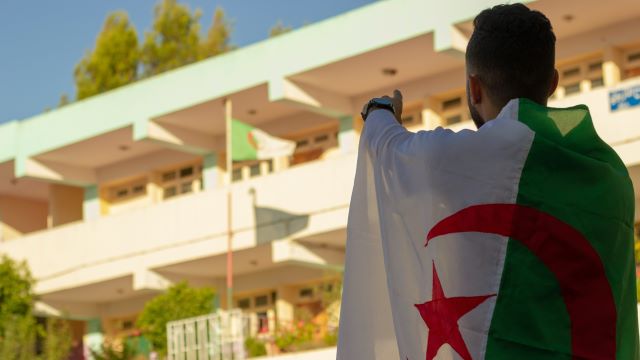By Sally Barenger
On a spring day in 2019, the avenues of Algiers filled with chants and flags. The air carried a mixture of defiance and cautious hope as tens of thousands marched past colonial façades and Ottoman-era gates, pressing for the end of an era. The Hirak Movement, as it came to be known, would soon redraw the country’s political map.
For decades, Algeria’s politics had moved within well-worn patterns—long-standing leaders, an entrenched ruling class, and the quiet but unmistakable presence of the military. Then, in February 2019, a spark was lit by the announcement that President Abdelaziz Bouteflika intended to seek a fifth term. Weeks later, under mounting public pressure, the veteran leader resigned, ending 20 years in power.
A Movement That Changed the Script
What began as a rejection of a single candidacy became a broader demand for systemic reform. The Hirak’s slogans called for an end to corruption, freer political expression, and a government more responsive to its citizens. Its persistence—protests continued well beyond Bouteflika’s departure—signaled that symbolic gestures would not suffice.
Official Responses and Lingering Skepticism
Abdelmadjid Tebboune’s election in December 2019 was presented as a step toward renewal. Constitutional reforms approved by referendum the following year promised limits on presidential terms, an empowered parliament, and greater judicial independence. Yet the ballot boxes told another story: voter turnout hit historic lows, reflecting doubts about whether these measures would reshape the system or merely reframe it.
Economic Fault Lines
Algeria’s dependence on hydrocarbons has long left it exposed to global oil price swings. The pandemic’s economic shock intensified inflation, unemployment, and public frustration. Tebboune’s government has moved to court foreign investors, ease bureaucratic hurdles, and diversify into agriculture, renewable energy, and digital industries.
Success remains contingent on more than new policy—it will require dismantling networks of entrenched corruption and demonstrating visible improvements in living standards. Patience is wearing thin.
The Military’s Enduring Shadow
Since the war of independence, Algeria’s military has been a central political force, sometimes openly, often indirectly. In the wake of Bouteflika’s resignation, its leadership positioned itself as a guardian of stability. For many in the Hirak, however, the armed forces’ continued influence stands in tension with calls for full civilian governance. Balancing the military’s role with democratic aspirations remains one of Tebboune’s most delicate challenges.
Algeria in the World
The country’s geographic reach—stretching from the Mediterranean coast deep into the Sahara—anchors it in multiple regional arenas. Algeria has played mediator in Mali and Libya and maintains a policy of non-interference rooted in its anti-colonial legacy. European energy partnerships, particularly with Spain and Italy, remain critical, even as Algiers navigates rivalries among Middle Eastern powers.
At a Threshold
The currents shaping Algeria’s political landscape are as much about memory as they are about momentum. The Hirak Movement shifted the national conversation, but translating public demands into structural change is proving complex. Economic reform, political transparency, and a recalibration of military influence are all intertwined in the nation’s uncertain path forward.
In a region where the past often presses into the present, Algeria stands at a threshold, negotiating between continuity and transformation. The outcome will shape not only its own future but the stability of North Africa at large.
Sources
- Amnesty International. Algeria: Human Rights Report 2023.
- International Crisis Group. Breaking the Mold: Prospects for Reform in Algeria, 2022.
- Oxford Analytica. Algeria’s Economic Reform Agenda, 2023.
- United Nations Economic Commission for Africa. North Africa Regional Outlook, 2023.

